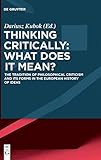Thinking Critically: What Does It Mean? : The Tradition of Philosophical Criticism and Its Forms in the European History of Ideas / Dariusz Kubok.
Material type: TextPublisher: Berlin ; Boston : De Gruyter, [2017]Copyright date: ©2018Description: 1 online resource (VI, 304 p.)Content type:
TextPublisher: Berlin ; Boston : De Gruyter, [2017]Copyright date: ©2018Description: 1 online resource (VI, 304 p.)Content type: - 9783110560084
- 9783110567229
- 9783110567472
- 101 23
- B105.T54 T45 2018eb
- online - DeGruyter
| Item type | Current library | Call number | URL | Status | Notes | Barcode | |
|---|---|---|---|---|---|---|---|
 eBook
eBook
|
Biblioteca "Angelicum" Pont. Univ. S.Tommaso d'Aquino Nuvola online | online - DeGruyter (Browse shelf(Opens below)) | Online access | Not for loan (Accesso limitato) | Accesso per gli utenti autorizzati / Access for authorized users | (dgr)9783110567472 |
Frontmatter -- Table of Contents -- Critical Thinking and Philosophical Criticism – an Outline of the Problem -- Criticism as Paradoxatism. The Heraclitean Critique of the Notion of Opinion -- Criticism as the Basis for the Procedures of Hypothetical Dialectic in Plato’s Philosophy -- Aspects of Criticism in Plato’s Philosophy -- References to Plato’s Theaetetus in book Γ (IV) of Aristotle’s Metaphysics -- Conversation and Conservation. Two Kinds of Anti-Dogmatic Criticism in the Philosophy of Politics and their Antecedents in Ancient Greek Forms of Skepticism and Fallibilism -- The Critical Dimension of Locke’s Epistemology -- The Old and New Critique of Pure Reason based on Immanuel Kant and Jakob Friedrich Fries -- Criticism as It Was Understood by Hermann Cohen -- Hermann Cohen’s Critical Exposition of Kant’s Critique of Taste -- Criticism and Rationality in the Lvov-Warsaw School -- Rationality and Criticism in the Views of the Philosophers of the Lvov-Warsaw School and K.R. Popper -- More than Words: from Language to Society. Wittgenstein, Marx, and Critical Theory -- Reflexive Social Critique. On the Dialectical Criticism of Ideology According to Marx and Adorno -- Skepticism and Atheism. Three Types of Relationships -- Criticism in Political Philosophy. On the Advantages of Pragmatism over Ideologized Politics in Light of the Works of Witold Gombrowicz -- Consolatio or Critical Methods? Reflections on Philosophical Counseling -- Plato’s Dialectics as a Method of Critical Reflection on Art -- Register
restricted access online access with authorization star
http://purl.org/coar/access_right/c_16ec
Analyses of the dynamics of change present in Europe are not complete without taking into account the role and function of the critical approach as a founding element of European culture. An appreciation of critical thinking must go hand-in-hand with reflection on its essence, forms, and centuries-long tradition. The European philosophical tradition has thematized the problem of criticism since its appearance. This book contains articles on the history of philosophical criticism and ways that it has been understood in European thought. Individual chapters contain both historical-philosophical and problem-oriented analyses, indicating the relationships between philosophical criticism and rationalism, logic, scepticism, atheism, dialectic procedure, and philosophical counseling, among others. Philosophical reflection on critical thinking allows for an acknowledgment of its significance in the fields of epistemology, philosophy of politics, aesthetics, methodology, philosophy of language, and cultural theory. The book should interest not only humanities scholars, but also scholars in other fields, as the development of an anti-dogmatic critical approach is a lasting and indispensible challenge for all disciplines.
Mode of access: Internet via World Wide Web.
In English.
Description based on online resource; title from PDF title page (publisher's Web site, viewed 26. Aug 2020)


